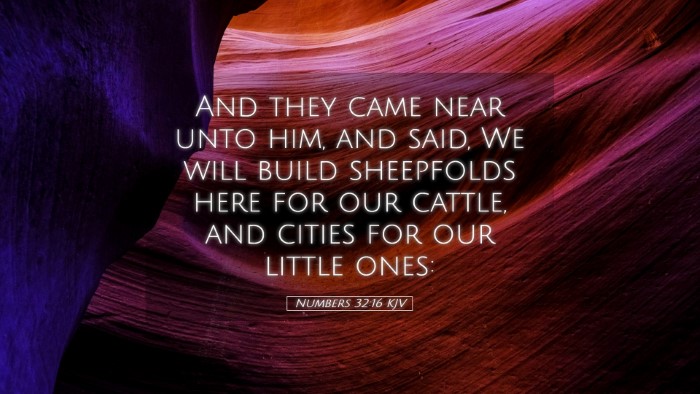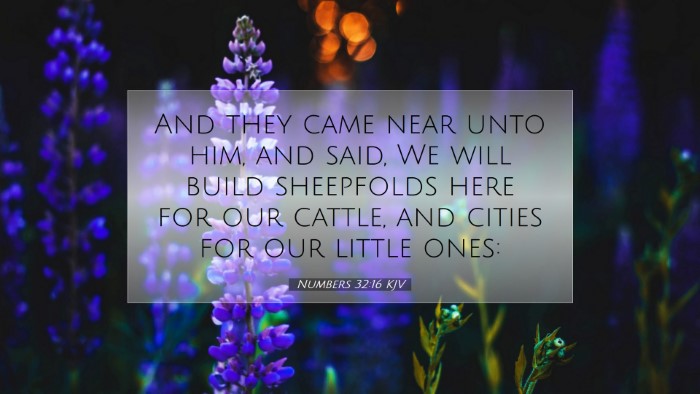Commentary on Numbers 32:16
Verse: Numbers 32:16 - "And they came near unto him, and said, We will build sheepfolds here for our cattle, and cities for our little ones."
Introduction
The 32nd chapter of Numbers presents an intriguing narrative regarding the tribes of Reuben and Gad and their desire to settle on the eastern side of the Jordan River. Their request for land raises profound theological and practical implications that echo throughout the scriptures. This commentary combines insights from respected public domain Bible commentators, offering a multifaceted view on this pivotal verse.
Contextual Background
To fully understand Numbers 32:16, it is essential to examine its context within the Book of Numbers. The Israelites are poised to enter the Promised Land after decades of wandering in the wilderness. The lands of the Amorites offer a fertile setting. Yet, Reuben and Gad find contentment in the pastures beyond Jordan, which results in a significant discussion on faith, commitment, and the concept of inheritance.
The Request of Reuben and Gad
According to Matthew Henry, the request by Reuben and Gad reveals their attachment to earthly comforts and practical needs. Their statement, "We will build sheepfolds here for our cattle, and cities for our little ones," indicates a deep concern for the material well-being of their families. In contrast to the nomadic lifestyle they had previously endured, this demonstrates a desire for stability and provision.
Focus on Material Needs
- Henry emphasizes that the request stemmed from a desire for comfort and security amidst a challenging environment.
- He notes that sheepfolds symbolize both protection and prosperity—a reflection of their priorities.
Theological Implications
Albert Barnes points out that this request reveals a tension between faith and practicality. The choice of Reuben and Gad to remain outside of the Promised Land exemplifies a potential lack of faith in God's promises. While they sought to secure their immediate needs, this decision also reflects their hesitance to embrace the full scope of God's deliverance.
The Danger of Half-Commitment
- Barnes remarks that the desire of these tribes to settle may lead to spiritual complacency.
- This choice would set a precedent for future generations, indicating that spiritual inheritance can be compromised by earthly priorities.
Faithfulness and Leadership
Adam Clarke elaborates on the implications of this decision regarding leadership. He emphasizes that leaders must balance the needs of their people with the divine calling to pursue God's ultimate plan. The request of Reuben and Gad puts Moses in a difficult position, one that requires him to assess their commitment not only to land but also to God’s mission.
Moses' Response
Clarke details that Moses' response is pivotal for understanding the implications of their choice. While Moses acknowledges their needs, he also warns them of the consequences of failing to fulfill their obligation to assist the other Israelite tribes in the conquest of Canaan. This reflects a broader principle of accountability in leadership.
Lessons for Today's Believers
The narrative surrounding Numbers 32:16 offers invaluable lessons for modern believers, particularly in leadership and congregational settings.
Embracing the Whole of God's Promise
- Believers are encouraged to prioritize spiritual inheritance over earthly comfort, seeking God’s will in all circumstances.
- This translates into both individual decision-making and community dynamics, emphasizing that faith must come before practicality.
The Importance of Community Commitment
The decision of Reuben and Gad serves as a reminder that our choices impact not just ourselves but also our communities. Matthew Henry stresses the importance of collective responsibility and shared faith journeys in the context of church leadership.
Conclusion
In conclusion, Numbers 32:16 encapsulates significant themes of faith, leadership, and the balance between earthly needs and spiritual commitment. The insights drawn from Matthew Henry, Albert Barnes, and Adam Clarke underscore the intricate interplay between God's promises and human decisions, ultimately calling believers to greater faithfulness and dedication to God's plans. As we reflect on this passage, let us seek to align our priorities with the steadfastness of God's intentions for our lives and communities.


